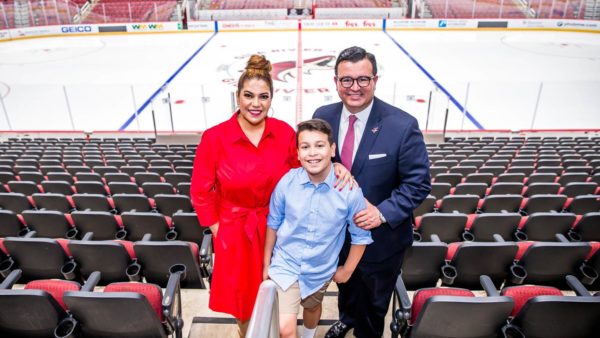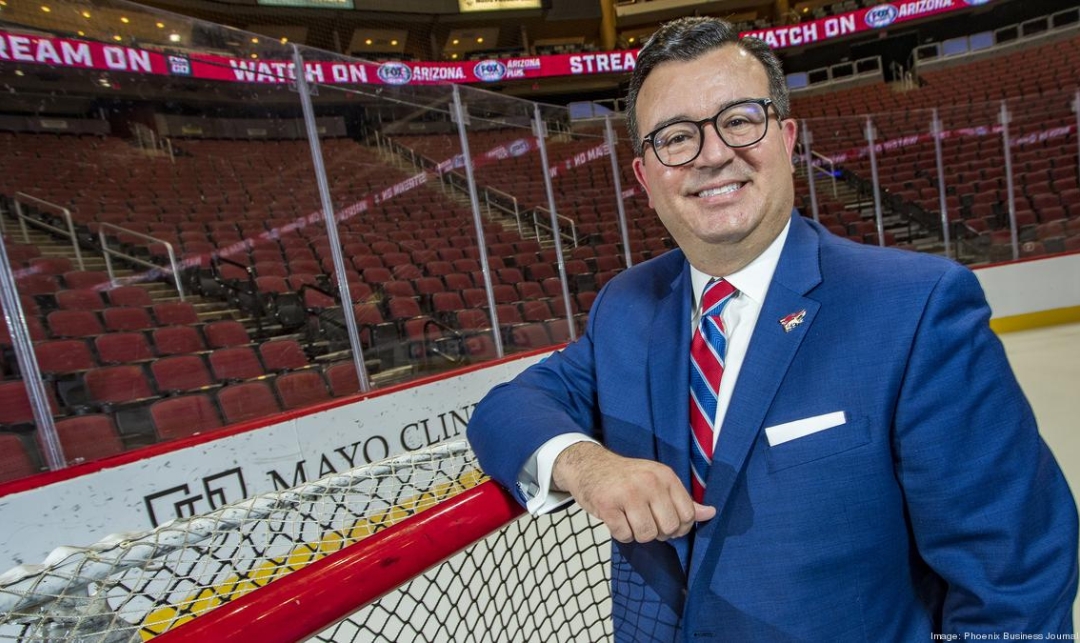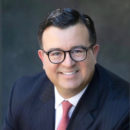Xavier A. Gutierrez was a National Hockey League (NHL) novice when he became the league’s first Latino president and CEO, heading the Arizona Coyotes beginning in June 2020. While his professional qualifications were top-notch, his familiarity with the game was minimal. “I couldn’t even skate,” he admits. Then, one week into the job, his GM quit.
It was a case of baptism by fire, on ice, on the Jumbotron. “It was quite public,” Gutierrez says of the contract dispute with the outgoing GM and the hiring process for a replacement. There were myriad issues to contend with, including personnel and draft pick crises that required his attention.
The ensuing months, navigated on the landscape of a developing pandemic, were a lesson in resilience during crisis management. Today, the hockey franchise, which moved to the Arizona desert from Winnipeg, Canada, in 1996, is positioning itself for long-term stability and success. The new GM, Bill Armstrong, hired in September 2020, built a solid track record during a 15-plus-year career with the St. Louis Blues.
Team ownership’s $2.1 billion multi-use entertainment district proposal was unanimously approved by the Tempe City Council and goes before voters in May 2023. The project, privately funded by majority owner Alex Meruelo, would be constructed on a refurbished landfill in Phoenix and be completed by 2025. For now, the team plays its home games at Mullett Arena, a boisterous and lively setting on the Arizona State University campus. “We’re really building the foundation for a sustainable winner,” Gutierrez says.
One of the first lessons Gutierrez has learned during his tenure is the camaraderie that exists among NHL executives.
“At the end of the day, we’re all business partners, right?” he says. “We might compete on the ice, but we all want to see each other succeed.” Gutierrez mentions L.A. Kings President Luc Robitaille, Florida Panthers President Matt Caldwell, and even Commissioner Gary Bettman among those who have offered guidance as Gutierrez has found his footing in professional hockey.
The parallels of running any business overlap 70% to 80% of the time, he says. “It’s that 20% to 30% where you need subject-matter experts to guide you in your decision making.” Some skill sets, however, are not easily interchangeable. “I’m not saying that running a television station is the same as running a professional sports team. But in my career, I’ve had the fortune of being able to have versatility of management experience as part of my toolkit.”
He was also the product of parents who “embraced the immigrant ethos of work, family and community, and doing for others.”

Gutierrez pictured with his family in Mullett Arena
VOICE OF THE FAMILY
Born in Guadalajara, Mexico, Gutierrez crossed the border into the U.S. with his mother, who was pregnant with his sister. Just 5 years old, he did not speak any English. As he progressed through school, however, he would become the voice of his family. “There’s something that happens when you get put in that position, especially at a young age, where you realize the power of your voice, literally to get directions or fill out applications for driver’s licenses and things like that.” For Gutierrez, this ability quickly morphed into a sense of responsibility.
The family settled in Fremont, where his dad was a mechanic at the GM (now Tesla) plant. His mom stayed at home to raise the kids until the youngest started kindergarten. “She eventually started volunteering at my school and took over the migrant education program for the school district, helping parents like her feel more engaged in their children’s education.”
Gutierrez attended Bellarmine College Preparatory in San Jose, an all-boys Jesuit institution and the oldest high school in California. “It was an incredible life experience,” he recalls. “There is a train stop at the school, so I actually had classmates all the way from San Francisco down to Morgan Hill. That’s about 150 miles.” Some rural farmland classmates would arrive at school in tractors; others were chauffeured from the toniest enclaves in Silicon Valley.
“I had the chance to go to school with the sons and nephews of the Silicon Valley elite,” he says. “I learned what a venture capital fund was as a 13-year-old.” When the time came to start thinking about college, Gutierrez’s mother suggested Harvard and Oxford, because those were the two institutions that represented the pinnacle of higher learning, based on what she had heard growing up.
Following her wishes, he earned his bachelor’s degree in government from Harvard University, and then his JD from Stanford Law School.
“It was their lifelong dream to see me and my three siblings really succeed,” he says of both his parents and his stepfather. “I’ve worked really hard, but it comes on the shoulders of my parents’ vision and hard work.”

PHOENIX – APRIL 4: NHL hockey game featuring the Phoenix Coyotes and Edmonton Oilers of the National Hockey League
GO WHERE THE PUCK IS GOING
Readily counting his blessings, Gutierrez points to the path set in motion by his mother’s tenacity and will for a better life, as well as his own role in capitalizing on the opportunities that he was fortunate enough to encounter in his education and career. “There have been some seminal door openers,” Gutierrez says.
Alex Meruelo certainly qualifies in that arena. Gutierrez served as CIO at Meruelo Group for nearly seven years, gaining valuable experience while there. He left in 2017 to become managing director at Clearlake Capital Group, joining Stanford Law School friend Jose E. Feliciano’s private investment firm. In 2019, Meruelo Group purchased the Coyotes, making its CEO the first Latino majority owner of an NHL franchise. Six months later, Meruelo reached out to Gutierrez with an unexpected opportunity.
“Alex called me in February 2020,” Gutierrez says. “Clearlake Capital was doing quite well. We had probably $35 billion in assets under management. He said, ‘I’m not gonna be able to convince you to take the position because of the coolness of sports or because of the deals.’ What he said that resonated with me was that sports has this unique voice and power to make a difference in people’s lives. And I’ve always been on a lifelong journey to help others live the American dream.”
Gutierrez recalls his first NHL Board of Governors meeting. Meruelo was governor; Gutierrez was alternate governor. “I was being introduced and Commissioner [Gary] Bettman said, ‘Xavier, why don’t you share part of your business plan?’”
Although his hockey knowledge was limited, Gutierrez was able to deliver an ace. “I used my Wayne Gretzky story, saying “‘They once asked Gretzky’s dad what makes Wayne so great and he says, ‘Wayne goes to where the puck is going, not where it’s been.’ I conveyed to the room that day: ‘We are gonna go where the puck is going, because we’re a consumer business, so where IS the puck going?’”
He proceeded to tell them:
“It’s going young, female, diverse, and in a place like Arizona, where 3 out of every 5 kids between the ages 8 and 13 are Latino, the future of the league is primed for a successful desert metropolis franchise leaning into diversity.”
Consider the following: Arizona is a fitness climate, with world-class athletes of myriad sports choosing to train or retire and raise their families there. As a result, youth hockey programs are robust. The environment is also attractive to active players, since the NHL season takes place during the colder winter months, when Phoenix is generally more hospitable than, say, the Great White North.
To that point, Gutierrez adds that Arizona “is the second-largest Canadian snowbird market in America. They live here or have a second home here. This is absolutely a hockey town.”

Tempe Arizona photographed from the Salt River during blue hour
FROM LANDFILL TO LANDMARK
Gutierrez acknowledges the organization’s challenging history, but his focus rests squarely on a sunny future, highlighted by plans for an expansive, 46-acre sports/entertainment complex. The project is set to include two hotels, a 3,500-seat theater, 350,000 square feet of office space, and another 350,000 square feet of restaurants and retail space. Gutierrez expects the project to generate 7,000 jobs and a projected $750 million in net new taxes.
“We’re building L.A. Live in the desert,” Gutierrez says. “It’s next to Tempe town lake, next to Arizona State University, right next to the airport.” In other words, location, location, location. “It’s going to be transformative,” he says.
Provided voters approve the ballot measure in May, construction will begin on the site of what Gutierrez calls “one of the best-in-class urban redevelopment projects in the country.” The landfill, which made local news when it caught fire last summer, has been an eyesore in the community for generations, so this would be a long overdue civic improvement.
For a franchise that is no stranger to controversy, Gutierrez is focused on turning the page in a major way. “Both on and off the ice, we are going to be about impact. We are going to leverage the incredible power of sports to make a difference.”
Looking ahead, Gutierrez sees a bright future for diversity in sports. “I believe I am the first private equity executive to sit in a president’s role. Many others own teams but to actually be running one, in charge of a franchise, is a very unique perspective,” he says. “I’m the only Latino currently sitting in this role in all of professional sports in North America. I certainly won’t be the last.”














































